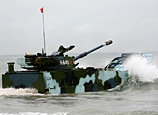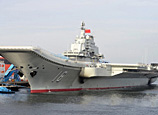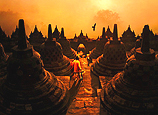
The Washington Post said that like "Aftershock," "Back to 1942' shows the director's mastery of chaotic spectacle, massed human motion and elegant camera movements. Both films demonstrate his tendencies toward glibness and sentimentality. Starvation and subtlety may be an unlikely pairing, but Feng's historical horror show would actually be more moving if it were less openly emotional.
In the face of death
Still, it has impact and messages on many levels.
The film centers on the sufferings of two families - that of Fan, a former landlord, and that of Xialu, Fan's tenant. As they flee their home in search of food, the situation gets even worse with the Japanese invasion, the weak Nationalist government, as well as greedy and corrupt officials. Character is revealed in the face of death.
Most scenes were shot in remote villages. Director Feng, cast and crew had to endure some hunger, thirst and harsh conditions.
Feng calls it one of his toughest but most rewarding films. "Our nation is characterized by tremendous sufferings in history. To know where we come from helps us understand where we should go," he said in an early interview.
Feng knew it was a risky venture. "Shooting this kind of film is like a gamble, challenging and uncertain for any famous filmmaker," he recently blogged. "At stake is the large fan base I built up over the years."
Despite its lack of commercial success, many people have been moved, and middle school teacher Zhou Bei says the film gave her fresh insight into both the fragility and strength of life. She cites a scene in which a farmer sells herself for a handful of millet to feed her children.
"Disaster is a cruel but very truthful test of humanity," she says. "Some people lose their dignity while others can do extraordinary things."
"The film helps me understand why many middle-aged and elderly Chinese prefer saving money in the bank," says Jeffrey Qiu, an office worker. "Even after living in comfort or affluence for many years, they don't feel secure. Disaster has left them scarred."
The Hollywood disaster blockbuster emerged in the 1970s and the genre is very mature and popular in China for spectacular and realistic visual effects, motional, well-told stories and heroism. "Titanic" (1997), "The Day After Tomorrow" (2004) and "2012" (2009) all saw great commercial success here.


















![]()
